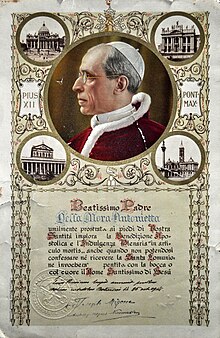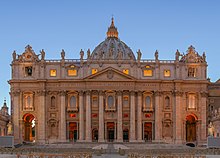
A | B | C | D | E | F | G | H | CH | I | J | K | L | M | N | O | P | Q | R | S | T | U | V | W | X | Y | Z | 0 | 1 | 2 | 3 | 4 | 5 | 6 | 7 | 8 | 9


In the teaching of the Catholic Church, an indulgence (Latin: indulgentia, from indulgeo, 'permit') is "a way to reduce the amount of punishment one has to undergo for (forgiven) sins".[1] The Catechism of the Catholic Church describes an indulgence as "a remission before God of the temporal punishment due to sins whose guilt has already been forgiven, which the faithful Christian who is duly disposed gains under certain prescribed conditions…"[3]
The recipient of an indulgence must perform an action to receive it. This is most often the saying (once, or many times) of a specified prayer, but may also include a pilgrimage, the visiting of a particular place (such as a shrine, church or cemetery) or the performance of specific good works.[4]
Indulgences were introduced to allow for the remission of the severe penances of the early church and granted at the intercession of Christians awaiting martyrdom or at least imprisoned for the faith.[5] The Catholic church teaches that indulgences draw on the treasury of merit accumulated by Jesus' superabundantly meritorious sacrifice on the cross and the virtues and penances of the saints.[6] They are granted for specific good works and prayers[6] in proportion to the devotion with which those good works are performed or prayers recited.[7]
By the late Middle Ages, indulgences were used to support charities for the public good, including hospitals.[8] However, the abuse of indulgences, mainly through commercialization, had become a serious problem which the church recognized but was unable to restrain effectively.[9] Indulgences were, from the beginning of the Protestant Reformation, a target of attacks by Martin Luther and other Protestant theologians. Eventually the Catholic Counter-Reformation curbed the abuses of indulgences, but indulgences continue to play a role in modern Catholic religious life, and were dogmatically confirmed as part of the Catholic faith by the Council of Trent. In 1567, Pope Pius V forbade tying indulgences to any financial act, even to the giving of alms. Reforms in the 20th century largely abolished the quantification of indulgences, which had been expressed in terms of days or years. These days or years were meant to represent the equivalent of time spent in penance, although it was widely mistaken to mean time spent in Purgatory. The reforms also greatly reduced the number of indulgences granted for visiting particular churches and other locations. [citation needed]
Catholic teaching
| Part of a series on the |
| Catholic Church |
|---|
 |
| Overview |
|
|
Catholic teaching states that when a person sins, they acquire the liability of guilt and the liability of punishment.[10] A mortal sin, one that is grave or serious in nature and is committed knowingly and freely, is considered to be an active refusal of communion with God, and to separate a person from him to the end of suffering the eternal death of hell as an effect of this rejection, a consequence known as the "eternal punishment" of sin. The Sacrament of Penance removes this guilt and the liability of eternal punishment related to mortal sin.[11]
The forgiveness of sin and restoration of communion with God entail the remission of the eternal punishment of sin, but the temporal punishment of sin remains. An example of this can be seen in 2 Samuel 12, when, after David repents of his sin, the prophet Nathan tells him that he is forgiven, but, "Thus says the Lord God of Israel:...Now, therefore, the sword shall never depart from your house, because you have despised me and have taken the wife of Uriah to be your wife."[12]
In addition to the eternal punishment due to mortal sin, every sin, including venial sin, is a turning away from God through what the Catechism of the Catholic Church calls an "unhealthy attachment to creatures", an attachment that must be purified either here on earth, or after death in the state called purgatory.[2] "The process of sanctification and interior renewal requires not only forgiveness from the guilt (culpa) of sin, but also purification from the harmful effects or wounds of sin."[13] This purification process gives rise to "temporal punishment", because, not involving a total rejection of God, it is not eternal and can be expiated. Catholic teaching states that the temporal punishment of sin should be accepted as a grace, and that the sinner "should strive by works of mercy and charity, as well as by prayer and the various practices of penance, to put off completely the 'old man' and to put on the 'new man'."[2]
The temporal punishment that follows sin is thus undergone either during life on earth or in purgatory. In this life, as well as by patient acceptance of sufferings and trials, the necessary cleansing from attachment to creatures may, at least in part, be achieved by turning to God in prayer and penance and by works of mercy and charity.[10] Indulgences (from the Latin verb 'indulgere', meaning "to forgive", "to be lenient toward")[13] are a help towards achieving this purification.
An indulgence does not forgive the guilt of sin, nor does it provide release from the eternal punishment associated with unforgiven mortal sins. The Catholic Church teaches that indulgences relieve only the temporal punishment resulting from the effect of sin (the effect of rejecting God the source of good), and that a person is still required to have their grave sins absolved, ordinarily through the sacrament of Confession, to receive salvation. Similarly, an indulgence is not a permit to commit sin, a pardon of future sin, nor a guarantee of salvation for oneself or for another.[14] Ordinarily, forgiveness of mortal sins is obtained through Confession (also known as the sacrament of penance or reconciliation).
According to the Catechism of the Catholic Church, "The 'treasury of the Church' is the infinite value, which can never be exhausted, which Christ's merits have before God. They were offered so that the whole of mankind could be set free from sin and attain communion with the Father. ... In Christ, the Redeemer himself, the satisfactions and merits of his Redemption exist and find their efficacy. ...This treasury includes as well the prayers and good works of the Blessed Virgin Mary. They are truly immense, unfathomable, and even pristine in their value before God. In the treasury, too, are the prayers and good works of all the saints, all those who have followed in the footsteps of Christ the Lord and by his grace have made their lives holy and carried out the mission in the unity of the Mystical Body."[2]
Pursuant to the church's understanding of the power of binding or loosing granted by Christ, it administers to those under its jurisdiction the benefits of these merits in consideration of prayer or other pious works undertaken by the faithful.[5] In opening for individual Christians its treasury, "the Church does not want simply to come to the aid of these Christians, but also to spur them to works of devotion, penance, and charity".[2]
Consistent with this, Peter J. Beer, SJ, writes in Theological Studies:[15]
I believe present Church praxis would benefit if the granting of an indulgence were restricted to a special public ceremony of penitential readings, prayers, etc., at which the bishop in person would bless those wishing to gain the indulgence, after praying over them. It would be helpful, too, if the ceremony were linked to the Eucharistic celebration. In this way the recipient would more likely feel that the full authority of the Body of Christ is supporting him as he carries out the indulgenced work.
Before the Second Vatican Council, stating that an indulgence of 40 days, 300 days or 7 years has been gained did not mean that a soul in Purgatory avoided a temporal punishment of 40 days, 300 days or 7 years; it meant, instead, that a soul in Purgatory avoided a temporal punishment of the same duration as that which it would have served with a traditional canonical penance of 40 days, 300 days or 7 years.
Dispositions necessary to gain an indulgence
An indulgence is not the purchase of a pardon which secures the buyer's salvation or releases the soul of another from purgatory. Sin is only pardoned (i.e., its effects entirely obliterated) when complete reparation in the form of sacramental confession is made and prescribed conditions are followed. After a firm amendment is made internally not to sin again, and the serious execution of one's assigned penance, the release of one from penalty in the spiritual sense consequentially follows.[9]
An indulgence may be plenary (remits all temporal punishment required to cleanse the soul from attachment to anything but God) or partial (remits only part of the temporal punishment, i.e. cleansing, due to sin).[2][16]
To gain a plenary indulgence, upon performing the charitable work or praying the aspiration or prayer for which the indulgence is granted, one must fulfill the prescribed conditions of:
- A complete and whole-hearted detachment from all sin of any kind, even venial sin
- Making a valid sacramental confession
- Receiving Holy Communion in the state of grace
- Praying for the intentions of the Pope.[17]
The minimum condition for gaining a partial indulgence is to be contrite in heart; on this condition, a Catholic who performs the work or recites the prayer in question is granted, through the church, remission of temporal punishment equal to that obtained by the person's own action.[17]
Since those who have died in the state of grace (with all mortal sins forgiven) are members of the communion of saints, the living (members of the Church Militant) can assist those whose purification from their sins was not yet completed at the time of death through prayer but also by obtaining indulgences in their behalf.[2] Since the church has no jurisdiction over the dead, indulgences can be gained for them only per modum suffragii, i.e. by an act of intercession.[5] This is sometimes termed 'impetration', which Aquinas explains "...is not founded on God's justice, but on His goodness".[citation needed]
Present discipline
 |
| Part of a series on the |
| Canon law of the Catholic Church |
|---|
